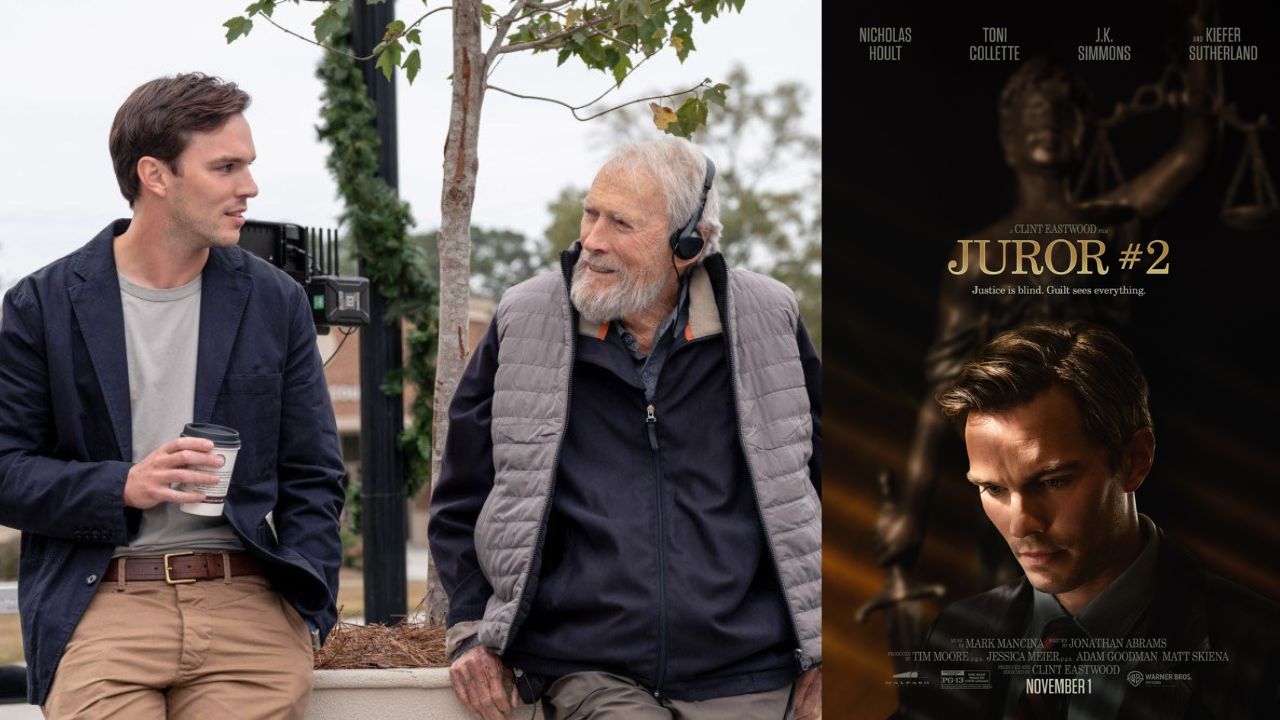Introduction
Clint Eastwood’s latest directorial effort, Juror #2, brings audiences face-to-face with the inner workings of a moral quandary, set against the backdrop of the American justice system. Known for his ability to delve deep into complex characters, Eastwood presents a tension-filled thriller that wrestles with questions of guilt, responsibility, and redemption. Starring Nicholas Hoult and Toni Collette, Juror #2 captures the intricacies of a courtroom drama with Eastwood’s seasoned direction, blending suspense with introspective depth. This review will unpack the film’s plot, characters, cinematography, and themes, ultimately asking if Juror #2 is a must-watch.
Plot: Tension and Turmoil in the Jury Box
The story revolves around Justin Kemp (Nicholas Hoult), a family man with a quiet life until he’s called to jury duty on a high-profile murder case. However, his role as Juror #2 isn’t straightforward; he realizes that he might be responsible for the very crime he’s judging. Torn between staying silent and ensuring a fair trial, Justin’s moral struggle intensifies as evidence unfolds, presenting him with impossible choices.
Eastwood structures the plot with a deliberate pace, skillfully interweaving past flashbacks with present courtroom scenes, effectively building suspense. The film shines in its ability to humanize Justin’s dilemma, immersing audiences in the psychological turmoil of a man torn between self-preservation and doing what is morally right. Fans of legal dramas, such as A Few Good Men and The Verdict, will recognize Eastwood’s homage to the genre while bringing his own distinctive perspective to the narrative.
Characters: The Morally Conflicted Everyman
Justin Kemp – Played by Nicholas Hoult, Justin is a conflicted character whose internal struggle is palpable. Hoult’s portrayal of guilt and emotional turmoil is exceptional, with subtle facial expressions that reveal the weight of his conscience. His journey is a testament to Eastwood’s ability to draw out complex characters.
Faith Killebrew – As the ambitious prosecutor (Toni Collette), Killebrew embodies a mix of determination and righteousness, but her desire for justice is laced with personal ambition. Collette’s performance brings tension and unpredictability, especially in courtroom confrontations, where her character’s confidence and moral certainty are challenged.
Erik Resnick – Chris Messina as the defense attorney provides a compassionate counterpoint, firmly believing in his client’s innocence. His character’s conviction contrasts with Justin’s growing doubts, emphasizing the film’s exploration of truth versus perception.
Harold (J.K. Simmons) – Harold is a juror who adds another layer of tension with his no-nonsense attitude, challenging Justin’s opinions and presenting a diverse representation of moral perspectives within the jury room. Simmons’ portrayal is powerful, although his character’s arc feels abrupt, leaving the audience wanting more.
Visuals and Cinematography: A Minimalist Approach
Eastwood’s restrained cinematography might feel understated, yet it serves the purpose of focusing on characters and their emotional journeys. Set in the confines of a courtroom and a jury room, the close-up shots of Hoult’s face capture his internal conflict. Eastwood, with cinematographer Tom Stern, adopts a clean, almost minimalist visual style that accentuates the moral weight of each scene without distraction.
However, the visual storytelling sometimes feels constrained, potentially due to budgetary limitations. The film lacks sweeping cinematic shots or dynamic angles that could have enriched the atmosphere. Yet, Eastwood’s strength lies in simplicity; he lets the story breathe without over-stylizing, allowing viewers to focus on Justin’s evolving turmoil.
Themes and Message: Justice, Morality, and Redemption
Eastwood explores timeless themes with a fresh lens, questioning the idea of justice in a flawed system. Juror #2 suggests that even well-intentioned people can fall victim to their own moral weaknesses, particularly when grappling with guilt. Justin’s predicament mirrors our inner conflicts, making the audience ponder the lengths one might go to protect oneself. The film echoes Eastwood’s past works, such as Unforgiven and Mystic River, by presenting moral ambiguity and a nuanced view of justice.
In one of the film’s more introspective moments, Justin’s dilemma forces him to reflect on the American justice system’s imperfections, showing how ambition and personal interests can cloud what’s right. The film suggests that justice is subjective, an idea that resonates strongly in today’s society, where bias and personal motives often influence verdicts.
Direction and Screenwriting: Eastwood’s Thoughtful Approach
At 94, Eastwood proves that his directorial skill remains sharp. The screenplay by Jonathan Abrams is tight, thoughtful, and full of the subtle moral questions that characterize Eastwood’s best films. While some characters, such as Kiefer Sutherland’s Larry Lasker, feel underdeveloped, the main cast is given ample space to shine.
The screenplay’s pacing is deliberate, reflecting the weight of Justin’s internal struggle. However, some viewers might find the plot progression too slow, especially if they’re accustomed to fast-paced legal thrillers. Nevertheless, Eastwood’s choice to focus on the internal conflict rather than external action results in a more profound experience.
Comparisons to Similar Films
Juror #2 bears resemblance to classics like 12 Angry Men, which also delves into the psychology of jurors. However, Eastwood’s film differs by adding a personal conflict that transforms the juror from a passive observer to an active participant with a stake in the outcome. Primal Fear and The Lincoln Lawyer are other notable legal thrillers that similarly examine the gray areas within the justice system, though they rely more on external twists than Juror #2’s introspective approach.
Final Verdict: Is Juror #2 Worth Watching?
In Juror #2, Clint Eastwood presents a powerful examination of morality under pressure, with Nicholas Hoult’s outstanding performance anchoring the story. Although some characters feel underutilized, the film’s strengths lie in its ability to provoke reflection on justice, guilt, and redemption. With a minimalist yet effective visual style and a cast that delivers, Juror #2 is a compelling legal drama that appeals to fans of morally complex narratives.
Where to Watch and More
For those who love thought-provoking courtroom dramas, Juror #2 is a highly recommended watch. Catch it in theaters or find streaming options at Where to Watch Juror #2 (2024) for an unforgettable cinematic experience. For similar films, check out our list of Best Legal Thrillers.
Watch the trailer on YouTube: Juror #2 Official Trailer.





